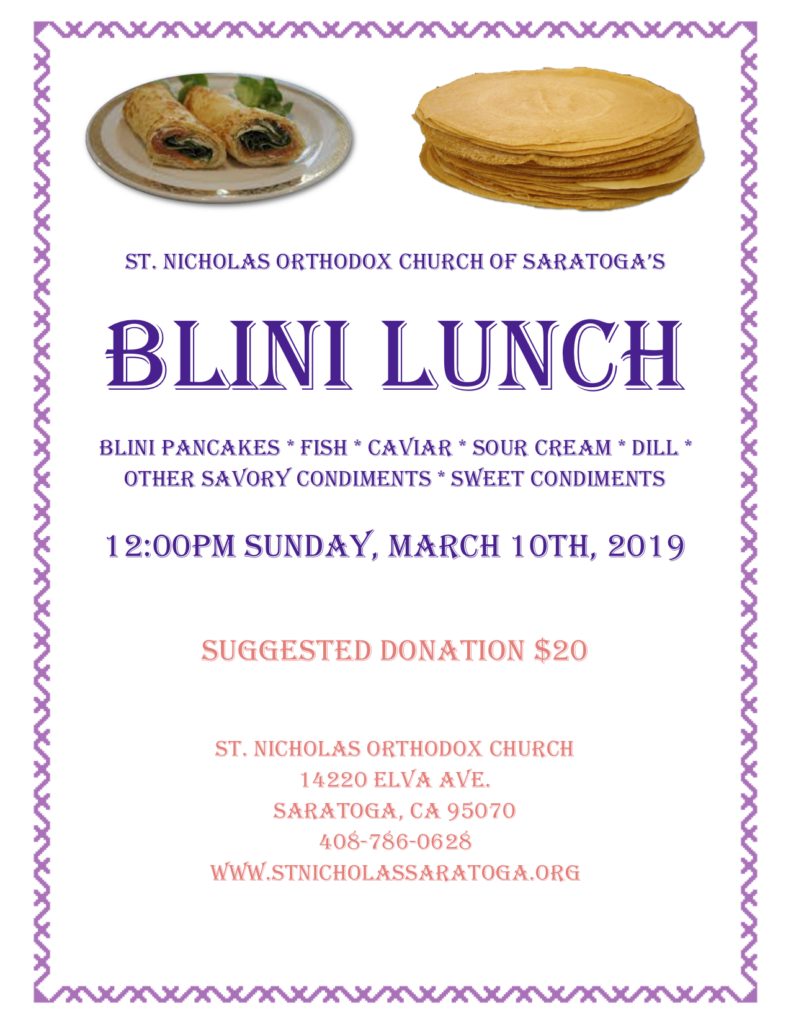
Focus on the Faith: The Glorious 4th of July
The Fourth of July is always a time for celebration in our land. It is a chance for family and friends to gather together for barbeques, outdoor activities, and fireworks. On Independence Day, the cause of our celebration is freedom, freedom from a cruel, repressive government, and freedom from a tyrannical king. This freedom is not only about liberation “from,” but also liberation “to!” Freedom means the ability to chart our own course, to work for our own goals, and to reap the fruits of our own labors.
It is common practice in our churches to offer a Prayer Service, a Molieben of Thanksgiving on the “Glorious Fourth,” and here, in the Pacific Central Deanery, it has been our custom for nearly 100 years to make a pilgrimage to Fort Ross and offer the Divine Liturgy there at the chapel in thanksgiving to God for this wonderful country of ours. This year is no exception. Liturgy on the 4th of July will be at 10:30 am at the Fort!
While this important civil holiday may not be found on our ecclesiastical calendars, we can certainly derive some spiritual food from it, right along with our festive foods and ice-cold beverages! The Fourth of July can be an opportunity for us to recall that there is a spiritual struggle for independence that goes on in our lives, and in our hearts, every single day. The tyrannical king is the devil; his cruel government is this fallen world and death; the overwhelming tax burdens and the tax collectors are our sins along with the demons who wait in the aerial toll-houses to accuse us at our death. These are the same demons, who would love nothing more than to kick the Heavenly King out of our hearts, and replace Him with seven more, more ferocious than themselves (Matthew 12:45)!
Nothing is better, nothing is more natural to human beings than spiritual freedom. The Lord Jesus Christ said: “If the Son (of God) therefore shall make you free, ye shall be free indeed” (John 8:36.) But in order to gain this freedom, this freedom which is only found in Christ, there needs to be a revolution, a revolution in us! Now the word “revolution” literally means to turn around. Isn’t that what repentance is? A turning around? A change of direction? A change of mind? Repentance is a spiritual struggle to turn, a spiritual revolutionary war against the tyranny of evil. Repentance is a noetic rebellion and an ascetic strategy of separation that employs spiritual armaments given to us by the grace of God. St Paul wrote to the Corinthians: “For though we walk in the flesh, we do not war after the flesh: For the weapons of our warfare are not fleshly, but our weapons have Divine power to pull down strongholds; casting down vain imaginations, and every high thing that exalts itself against the knowledge of God, and brings into captivity every thought to the obedience of Christ” (2 Corinthians 10:3-5.)
So, then, the Fourth of July can serve as a good reminder to us that we need to keep up the struggle and “Fight the good fight of faith” (1 Tim. 6:12.) It’s only when we let our guard down, relax our efforts and our resolve, that we find ourselves slipping back into the clutches of our Adversary, the King of wickedness, and falling into the tyranny of his cruel and oppressive government. “Stand fast therefore” (says St. Paul) “in the liberty wherewith Christ hath made us free, and be not entangled again with the yoke of bondage” (Galatians 5:1.) Amen.
Orthopraxis – Some Saints in July
Venerable Father Sergius of Radonezh
Our venerable father Sergius of Radonezh was a an ascetic and wonder-worker in the fourteenth century who founded the Holy Trinity Lavra north of Moscow in what is now known as Sergiev-Posad. He is much revered and has a very special place in Russian monasticism and in the hearts of all those who love God in Russia. An ascetic, he was deeply humble and had a firm faith in God's help. After his glorification the monastery he founded became known as the Holy Trinity-St. Sergius Lavra.Venerable Paisios the New, of the Holy Mountain
On the 12th of July, we honor the memory of our venerable Father Paisios the New, of the Holy Mountain, also known as Elder Paisios, who was a monastic of Mount Athos. An ascetic, he was known by his spiritual children and his visitors for his humility, his gentle manner, his acceptance of those who came to receive his advice, counsel, and blessing. St. Paisios was also known for his miracle-working. His words of counsel continue to be published today. Fr. Basil was blessed to meet with St. Paisios at his cell on Mount Athos in 1987. He reposed in peace in the year 1994.Holy Royal New Martyrs - July 17
The Holy Royal New Martyrs and Passion-bearers include Emperor Nicholas II, Empress Alexandra, Grand Duke Tsarevich Alexis, Grand Duchesses Olga, Tatiana, Maria, and Anastasia. Fr. Nektarios Serfes wrote: “All of us can rejoice in spirit knowing that... we have before the Throne of our God these precious, loving, martyrs praying and interceding on our humble behalf, we who are poor sinners.”Greatmartyr Marina/Margaret - July 17
This Martyr lived during the reign of Claudius II (268-270). She was from Pisidia of Cilicia and was the only daughter of a certain priest of the idols. On being orphaned by her mother, she was handed over to a certain woman who instructed her in the Faith of Christ. When she was fifteen years old, she was apprehended by the ruler of Olmbrius, and when asked her name, homeland, and faith, she answered: "My name is Marina; I am the offspring of the Pisidia; I call upon the Name of my Lord Jesus Christ." Because of this she endured bonds, imprisonment, and many whippings, and was finally beheaded in the year 270. Saint Marina is especially invoked for deliverance from demonic possession.The Righteous Yakov (Jacob) Netsvetov of Alaska - July 26th
Our righteous Father Jacob Netsvetov, Enlightener of Alaska, was a native of the Aleutian Islands who became a priest of the Orthodox Church and continued the missionary work of St. Innocent among his and other Alaskan people. His feast day is celebrated on the day of his repose, July 26, 1864.From the Fathers – On Freedom
“The Word became flesh…in order to make us earthly beings into heavenly ones, in order to make sinners into saints; in order to raise us up from corruption into incorruption, from earth to heaven; from enslavement to sin and the devil – into the glorious freedom of children of God; from death – into immortality, in order to make us sons of God and to seat us together with Him upon the Throne as His royal children. O, boundless compassion of God! O, inexpressible wisdom of God! O, great wonder, astounding not only the human mind, but the angelic [mind] as well!”
+ St. John of Kronstadt, Sermon on the Nativity of Jesus Christ
In truth there is only one freedom – the holy freedom of Christ, whereby He freed us from sin, from evil, from the devil. It binds us to God. All other freedoms are illusory, false, that is to say, they are all, in fact, slavery.”
+ St. Justin Popovich, Ascetical and Theological Chapters, II.36
“Some people by the word freedom understand it to mean the ability to do whatever one wants … People who have allowed themselves more and more to become slaves to sins, passions, and defilements, more often than others appear as zealots of external freedom, wanting to broaden the laws as much as possible. But such a man uses external freedom only to more severely burden himself with inner slavery. True freedom is the active ability of a man, who is not enslaved to sin, who is not pricked by a condemning conscience, to choose what is better in the light of God’s truth, and to bring it into actuality with the help of the gracious power of God. This is the freedom which neither heaven nor earth can restrict.”
+ St. Philaret of Moscow, Sermon on the Birthday of Emperor Nicholas I, 1851


